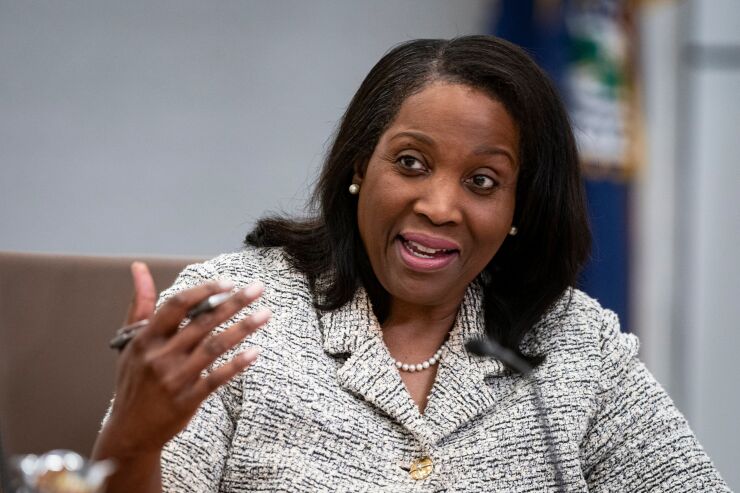The issues facing banks today are signs of the times: A focus on activism and disclosing climate metrics, in addition to banks having to adjust to new Federal Reserve and Federal Deposit Insurance Corp. policies, are challenging organizations and their investors.
JPMorgan Chase and Citigroup agreed to reveal
In their latest proxy statements, Bank of America and Goldman have both recommended that shareholders vote against the shareholder resolution; Morgan Stanley has not yet publicly released its proxy statement.
Read more:
In its argument, Bank of America said that Bloomberg currently calculates energy supply finance ratios for global banks. It also pointed to its goal of achieving net zero greenhouse gas emissions before 2050 and its assistance to clients in their transitions to net zero.

Goldman wrote that it will be disclosing a "significant amount of new sustainability and climate-related data over the next year," which may include the energy supply financing ratio. It pointed to European regulations in explaining the new disclosures.
The
"The current set of bank regulators may approve some non-small-bank M&A applications — particularly in the name of financial stability if the target bank is troubled," Katz said to American Banker's
Read more:
This all comes amid an uncertain stock market and scrutinized performance of major stock listings. Bank stocks are still recovering from a challenging 2023, and are eagerly awaiting strong signals from the Federal Reserve that interest rate cuts are indeed in the cards, which could help drive a serious rally. Meanwhile, the Fed's Board of Governors is closely monitoring record stock market valuations as a potential
Read more on these and other challenges banks and investors are facing below.

Fed looking into 'magnificent seven' stocks and their market roles
Federal Reserve Board of Governors member
"Having been a stock analyst, I'm always concerned about any increase in value beyond the underlying fundamentals of a company," Cook said after delivering a guest lecture at Harvard University. "We're watching this closely from a financial stability perspective."
The topic of a stock market bubble was raised in relation to the then-recent record-high closings for the U.S. top exchange. A few days before her speech, the Nasdaq Composite — which is heavily weighted toward the country's top tech firms — closed on a record high.
Read more:

Citigroup and JPMorgan Chase agree to divulge energy supply financing ratio
Citigroup and JPMorgan Chase will soon begin publicly divulging what's known as the energy supply financing ratio, which measures a company's level of financing for low-carbon energy versus fossil fuels, after facing pressure from the New York City comptroller's office and three New York City pension funds.
"We found common ground with NYC Comptroller on disclosing a clean energy financing ratio with an understanding that it is going to take us some time and resources to develop a decision useful approach," a spokesperson for JPMorgan Chase said in a statement.
The moves by these two banks follow a loss of momentum last year by
Read more:

Proposed FDIC policy will have a stifling effect on large bank mergers
The Federal Deposit Insurance Corp. issued a new proposed statement of policy on bank merger transactions in March that has made the administration's widely-understood skepticism of bank consolidation official, especially when it comes to large firms. This statement is expected to heighten Biden-era regulators' emphasis on financial stability and competitiveness of markets when vetting deals and is likely to increase frustration among larger institutions aiming to merge.
"[It highlights] how brutally challenging it is to be a bank with assets between $50B and $250B, which face the same regulatory costs of JPMorgan but are [fifteen times] smaller — and regulators seem unlikely to permit them to merge to gain scale," Brian Graham, a partner with the Klaros Group, said to American Banker's
Read more:

Bank stocks are recovering, but need further boost from Fed rate cuts
Bank stocks are recovering after a tough year in 2023, but are treading lightly and may need further signals from the Federal Reserve that interest rate cuts are in the cards for this year to mount a serious rally. In March, the Fed balked at a rate reduction, but hinted cuts are coming, with the KBW Nasdaq Bank Index rising more than 2% on that day.
While Fed officials are keeping their target rate in the 5.25% to 5.50% range, a majority of policy officials projected in a report that three rate cuts were possible this year. They next meet in May and then again in June.
For the near term, however, "the path forward is uncertain," Fed Chair Jerome Powell said during a press conference in March. "We are strongly committed to returning inflation to our 2% objective."
Read more:

Capital One is developing community investment plan with Discover acquisition
Capital One is "proactively meeting" with organizations to support the creation of a community benefits plan to accompany its
Community benefits plans have become commonplace in connection with acquisitions as banks seek to outline to regulators how their deals will satisfy Community Reinvestment Act requirements. Such agreements often include pledges to expand banking services in low- and moderate-income areas. The commitments typically fall in three buckets — community development lending and investments; affordable housing and residential mortgage lending; and philanthropic dollars.
One group that is not active in discussions with Capital One is the National Community Reinvestment Coalition, a fair-lending advocacy group that has negotiated 21 community benefits plans with banks since 2016, according to the website. The NCRC, which has more than 700 member organizations, opposes Capital One's pending acquisition of Discover, arguing that much of Capital One's business model takes advantage of lower-income credit card holders, and that the deal would diminish competition.
Read more:





